-
Kathleen Therese Bechtold, PhD
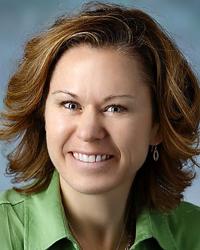
- Director, Psychology Training, Department of Physical Medicine and Rehabilitation
- Associate Professor of Physical Medicine and Rehabilitation
-
Nicole Schechter, PsyD
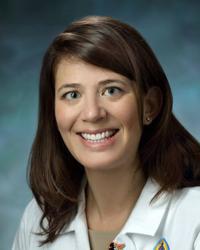
- Director, Postdoctoral Fellowship in Rehabilitation Psychology
- Associate Professor of Clinical Physical Medicine and Rehabilitation
-
Eva Sophia Catharine Keatley, PhD
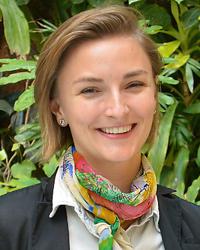
- Co-director, Postdoctoral Fellowship in Neuropsychology
- Assistant Professor of Physical Medicine and Rehabilitation
-
William Stiers, PhD
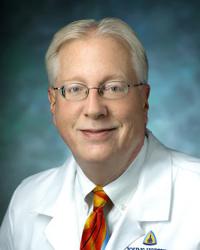
- Co-director, Postdoctoral Fellowship in Neuropsychology
- Associate Professor of Physical Medicine and Rehabilitation
-
Rachel V. Aaron, PhD
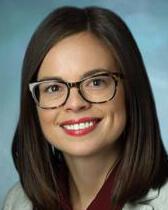
- Director, Postdoctoral Fellowship in Pain Psychology
- Assistant Professor of Physical Medicine and Rehabilitation
-
Abbey Hughes, PhD
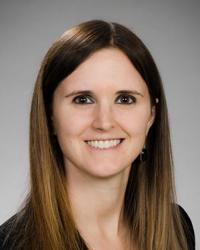
- Director, Division of Rehabilitation Psychology and Neuropsychology
- Associate Professor of Physical Medicine and Rehabilitation
The Division of Rehabilitation Psychology and Neuropsychology in the Johns Hopkins Department of Physical Medicine and Rehabilitation (PM&R) offers several specialty postdoctoral fellowship programs and predoctoral externships. Our clinical fellowships offer a major area of study in Rehabilitation Psychology or Neuropsychology.
We are accepting applications for our rehabilitation psychology and neuropsychology fellowships. Deadline for application materials is December 8 at 11:59 p.m. E.T. Please see our handbook below for program information, rotation descriptions, and policies.
Download our Fellowship Handbook (.pdf)
On this page:
Overview | Programs | Directors | Fellows | Contact Us
Overview of PM&R Rehabilitation Psychology and Neuropsychology Fellowship Programs
-
The mission of our postdoctoral fellowship programs is to provide an organized sequence of experiential and didactic education and training activities in diverse rehabilitation settings and with focused supervision and mentoring. Our programs focus on adult rehabilitation populations with a wide range of injuries, illnesses, disabilities, and acute and chronic health conditions.
-
Fellowship activities support the development of Advanced competencies in:
- Integration of science and practice
- Individual and cultural diversity
- Ethical, legal, and professional standards (consistent with the Implementing Regulations of the APA Commission on Accreditation).
- Specialty competencies sufficient for independent practice and/or research, eligibility for specialty board certification (ABPP), and professional leadership.
-
1st Year Rehabilitation Psychology Fellow
3 days/week acute inpatient rehabilitation (three 4-month rotations)
1 day/week outpatient rehabilitation clinic (example populations: chronic pain clinic, covid, multiple sclerosis)
½ day/week didactics
½ day/week research
1st Year Neuropsychology Fellow
3 days/week acute inpatient rehabilitation
1 day/week outpatient neurorehabilitation clinic (example populations: stroke, multiple sclerosis, TBI/ABI, SCI/D, cancer)
½ day/week didactics
½ day/week research
2nd Year Rehabilitation Psychology Fellow
3-4 days/week outpatient rehabilitation clinic (example populations: chronic pain clinic, covid, multiple sclerosis)
optional minors: 1 day/week medical ICU, 1 day/week neurorehabilitation clinic
½ day/week didactics
½ day/week research
2nd Year Neuropsychology Fellow
3 days/week outpatient neurorehabilitation clinic (example populations: stroke, multiple sclerosis, TBI/ABI, SCI/D, cancer)
minor: 1 day/week pediatric neuropsychology at Kennedy Krieger Institute
½ day/week didactics
½ day/week research
*Schedules and rotation duration subject to change based on supervisor availability.
Our Fellowships
You must complete all doctoral degree requirements, including dissertation and predoctoral internship, before the start of the program to be eligible for postdoctoral training. Proof of degree completion, a transcript or an official letter from your director of clinical training, must be received, ideally at least 30 days before your start date.
Please refer to our comprehensive Fellowship Handbook (.pdf) for history of the program, description of training sequence and rotations, and all policies and procedures.
Please use our application portal to apply for our fellowships.
-
Postdoctoral Fellowship in Neuropsychology
Duration: Two years
Number of positions: One
APPCN-member program -
Postdoctoral Fellowship in Rehabilitation Psychology
Duration: Two years
Number of positions: Two
CRPPTP-member program -
Postdoctoral Fellowship in Multiple Sclerosis Rehabilitation Research
Duration: One to three years
Number of positions: One
Duration contingent on funding and fellow’s goals -
Postdoctoral Fellowship in Pain Psychology
Duration: One to two years
Number of positions: One
Duration contingent on funding and fellow’s goals
Program Directors
Meet our Psychology Fellows
Rehabilitation Psychology and Neuropsychology fellows in our programs demonstrate impressive and diverse training backgrounds, clinical excellence, research scholarship and advocacy activities. They engage in mentored clinical care and research and present their work in high-quality peer-reviewed journals (e.g., PM&R, Archives of PM&R, Rehabilitation Psychology, The Journal of Pain, Health Psychology) and at national and international conferences (e.g., rehabilitation psychology, International Neuropsychological Society and US Association for the Study of Pain conferences).
-
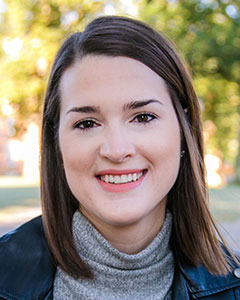
Julia Cozart, Ph.D. – Neuropsychology Postdoctoral Fellow (she/her)
Graduate Program: University of Missouri-Kansas City
Internship Program: The Charleston Consortium
Undergraduate Program: William Jewell College
Professional Interests: Neuropsychological assessment and intervention, brief behavioral interventions for neurologic populations, multiple sclerosis (MS), health neuropsychology, brain-healthy lifestyle psychoeducation.
Fun fact/hobby: I am married to my high school sweetheart. I enjoy walking, biking, and listening to music and podcasts. My dog, Josie (Maltese/Yorkie mix), has been my trusty sidekick for almost 5 years now.
Why I Chose Johns Hopkins PM&R for Fellowship: I chose Johns Hopkins PM&R for the unique opportunities to combine neuropsychological principles with therapeutic interventions, and to continue pursing my research and clinical interests in MS. During the interview process, I found the faculty to be supportive, kind, and value driven. Overall, the elite training experiences and caring mentors drew me to this outstanding program.
Candice Golembo, Psy.D. – Rehabilitation Psychology Postdoctoral Fellow (she/her)
Graduate Program: Loyola University Maryland, Clinical Psychology
Internship Program: University of Washington School of Medicine
Undergraduate Program: University of California, Santa Barbara, Psychology
Professional Interests: Health equity, critical care, neuropsychological assessment, neurorehabilitation, disability identity development, advocacy
Fun fact/hobby: I was born and raised in Johannesburg, South Africa and immigrated to the U.S. at 17 years old. I love the outdoors and have enjoyed the steep climb to the summit of Table Mountain.
Why I Chose Johns Hopkins PM&R for Fellowship: Led by passionate, empathic, and dedicated faculty, Johns Hopkins PM&R offers a wide variety of dynamic and exceptional training experiences that emphasize the thoughtful integration of both intervention and neuropsychological assessment. Having completed a predoctoral externship at Johns Hopkins PM&R, I knew I wanted to return to this supportive and energetic environment!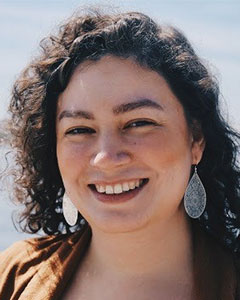
Kristen Pasko, Ph.D. - Pain Research Postdoctoral Fellow (she/her)
Graduate Program: Rowan University Clinical Psychology
Internship Program: Geisinger Medical Center
Undergraduate Program: University of Scranton
Professional Interests: chronic illness/injury adjustment, psychosocial influences on health behavior engagement, coping with changes in body image (appearance and functionality)
Fun fact/hobby: In my free time, I enjoy visiting local coffee shops, reading, or taking day trips to the beach.
Why I Chose Johns Hopkins PM&R for Fellowship: I chose Johns Hopkins PM&R for the opportunity to expand a growing passion in chronic pain assessment, treatment, and research. I have long been motivated to understand chronic illness/injury adjustment, though now see my work focusing on the multitude of ways in which individuals' relationships with their bodies change with fluctuations in appearance and functionality. Additionally, I felt excited about the prospect of working with this seemingly warm, supportive, and talented department.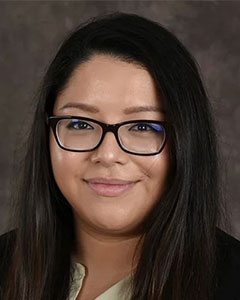
Debbie Torres, Ph.D. - Rehabilitation Psychology Postdoctoral Fellow (she/her/ella)
Graduate Program: Sam Houston State University, Clinical Psychology
Internship Program: University of Kansas Medical Center
Undergraduate Program: Texas Tech University, Biology
Professional Interests: Rehabilitation psychology, brief intervention, trauma-informed care, health equity/disparity, caregiver adjustment and support, adjustment to disability/chronic illness, oncology, biopsychosocial outcome predictors, lifespan populations
Fun fact/hobby: I enjoy listening to audiobooks, spending time with my sweet labrador-retriever dog, and trail walking/hiking.
Why I Chose Johns Hopkins PM&R for Fellowship: I chose Johns Hopkins PM&R due to the broad and immeasurable training opportunities available. Additionally, the faculty’s extensive knowledge and expertise in conjunction with their supportive and approachable demeanor truly sealed the deal for me! -

Katrina “Kat” Colby, Ph.D. - Rehabilitation Psychology Fellow (she/her)
Graduate Program: Palo Alto University, Clinical Psychology
Internship Program: W.G. (Bill) Hefner Salisbury Department of VA Medical Center
Undergraduate Program: University of Idaho, Psychology and Microbiology
Professional Interests: neurorehabilitation, neuropsychological assessment and intervention, brain injury, critical care, adjustment to disability/chronic health conditions, health equity, trauma-informed care
Fun fact/hobby: "I enjoy cooking, watching documentaries, and exploring new places with my two chihuahuas."
Why I Chose Johns Hopkins PM&R for Fellowship: "I chose Johns Hopkins because it is one of the nation's preeminent academic teaching institutions, and the department of PM&R offers abundant opportunities for training and mentorship in rehabilitation and neuropsychology.”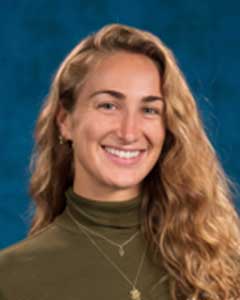
Lindsey Holbrook, Ph.D. - Neuropsychology Fellow (she/her)
Graduate Program: Rosalind Franklin University of Medicine and Science, Clinical Psychology
Internship Program: Louis Stokes Cleveland VA Medical Center
Undergraduate Program: University of Utah, Psychology
Professional Interests: intersection of neuropsychology and rehabilitation with specific interest in neuroplasticity and the use of technology in rehabilitation
Fun fact/hobby: “I enjoy singing am learning piano as an accompaniment."
Why I chose Johns Hopkins: "I chose Johns Hopkins due to the unrivaled training opportunities and access to cutting edge interventions and rehabilitation techniques. I could not be more excited to immerse myself in such a fast-paced environments with incredible mentors; and know I will leave my post-doc with the best training possible to make me an informed and competent clinician.”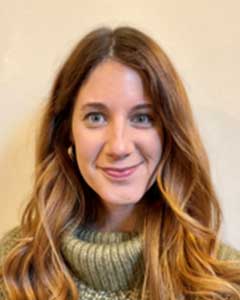
Julie Murray, Ph.D. - Rehabilitation Psychology Fellow (she/her)
Graduate Program: Utah State University, Clinical and Counseling Psychology
Internship Program: Medical College of Wisconsin
Undergraduate Program: Temple University, Psychology
Professional Interests: adjustment to disability/chronic illness, oncology, biopsychosocial predictors of surgical outcomes, pain management
Fun fact/hobby: “I have an adventure cat that walks on a leash and joins me on hikes."
Why I chose Johns Hopkins: " I chose Johns Hopkins PM&R because of the wide range of training opportunities and the supportive and down-to-earth nature of the faculty throughout the interview process.” -

Jeremiah Lum, Ph.D. - Neuropsychology Fellow, Chief Fellow 2023 - 2024
Graduate Program: Seattle Pacific University
Internship Program: Bay Pines VA Healthcare System, Neuropsychology Track
Undergraduate Program: University of Washington, Seattle
Professional Interests: clinical neuropsychology, advanced neuropsychological interpretive methods, performance validity, psychological predictors of cognitive test scores, therapeutic assessment modalities, rehabilitation psychology, brief behavioral interventions for families/caregivers of individuals with neurologic disease or insult, caregiver burden
Fun fact/hobby: "In my spare time I enjoy breeding exotic animals, reading, collecting fountain pens, and spending time outdoors"
Why I Chose Johns Hopkins PM&R for Fellowship: "Formal training in rehabilitation neuropsychology is very rare and is what initially drew me to PM&R at Johns Hopkins. Our division embodies the idea that assessment and intervention are not mutually exclusive, and, when thoughtfully integrated, lead to more comprehensive treatment recommendations than either specialty in isolation. The faculty's knowledge in these areas, and their focus on individualized professional development, are exemplary. I am humbled at the chance to learn from them in this fast-paced academic medical environment!"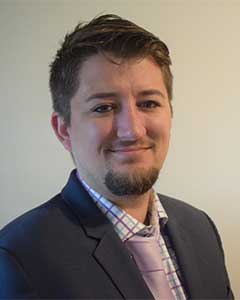
Brett Opelt, Ph.D. - MS Rehabilitation Fellow
Graduate Program: New Mexico State University, Counseling Psychology
Internship Program: El Paso VA Health Care System
Undergraduate Program: University of Wisconsin-Milwaukee
Professional Interests: MS symptoms, behavioral sleep medicine, DBT and ACT interventions for MS symptom management, and family understanding of disability
Fun fact/hobby: "I enjoy watching new TV shows and knitting while watching TV. I am extroverted, although I hate the cold and will 'hibernate' during winter. Summer activities are more my jam."
Why I chose Johns Hopkins: "I chose Johns Hopkins PM&R because the supportive, closeness, and genuineness of the department shined through during my interview. And since starting in the department, they have shown those same behaviors in person. The learning more about MS and the chance to being part of the MS Rehab research team."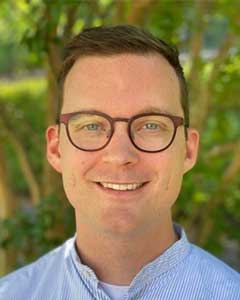
Scott Ravyts, Ph.D. - Pain Psychology Fellow
Graduate Program: Virginia Commonwealth University, Clinical Psychology
Internship Program: Duke University Medical Center
Undergraduate Program: The University of Texas, Psychology
Professional Interests: pain management, behavioral sleep medicine, adjustment to chronic illness, trauma
Fun fact/hobby: "I was born in Belgium and my first language is French."
Why I chose Johns Hopkins: "I chose Johns Hopkins for the depth of research and clinical opportunities related to pain psychology, the ability to collaborate with researchers within and outside of PM&R, and for the faculty’s commitment to training well-rounded psychologists."
Alexandria Rogers, Ph.D. - Rehabilitation Psychology Fellow, Chief Fellow 2023 - 2024
Graduate Program: University of Georgia, Counseling Psychology
Internship Program: Hennepin Healthcare
Undergraduate Program: The Pennsylvania State University, English and Psychology
Professional Interests: rehabilitation psychology, chronic pain, adaptation to chronic illness, health disparities, caregiver support, trauma
Fun fact/hobby: "I sang at the White House with my choir and can play four instruments."
Why I chose Johns Hopkins: "Johns Hopkins PM&R is home to some of the most influential people in the fields of rehabilitation psychology and neuropsychology. Johns Hopkins is one of the best hospitals in the world and offers impeccable training, while also creating a familial atmosphere. The opportunity to obtain further training in acute rehabilitation and chronic pain in my home state was an easy decision." -
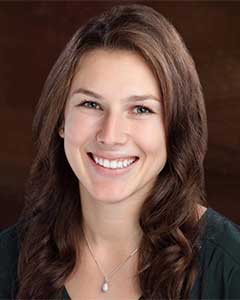
Nicolette Carnahan, Ph.D. - Rehabilitation Psychology Fellow
Graduate Program: American University, Clinical Psychology
Internship Program: Central Virginia VA Healthcare System
Undergraduate Program: Whitman College, Psychology
Professional Interests: adjustment to disability/chronic health conditions, trauma-informed care, traumatic brain injury and suicide risk, values-based interventions
Fun fact/hobby: "I was a collegiate soccer player and continue to enjoy any activity that incorporates teamwork, exercise, and/or the outdoors."
Why I chose Johns Hopkins: "I chose Johns Hopkins PM&R due to the breath and quality of the clinical, research, and professional development opportunities in rehabilitation psychology, as well as the chance to work closely with supportive and exceptional faculty and students. During my training experience as a predoctoral extern here, I was struck by the supportive environment that has been created and wanted to become a part of this community of fantastic, empathic, and extremely competent psychologists and human beings."
Brook Clark, Ph.D. - Neuropsychology Fellow, Chief Fellow 2022 - 2023
Graduate Program: University of Montana, Clinical Psychology
Internship Program: University of Missouri Health Sciences Consortium
Undergraduate Program: University of Montana, Anthropology
Professional Interests: neuropsychological oncology, symptom and performance validity, chronic illness rehab
Fun fact/hobby: anything forensic science
Why I chose Johns Hopkins: "Faculty are all exceptional and dedicated teachers and foster an environment of collaboration."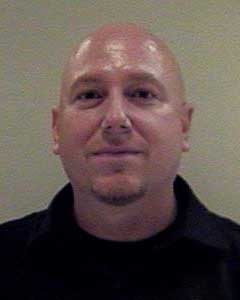
Andrew D. May, Psy.D. - Rehabilitation Psychology Fellow, Chief Fellow 2022 - 2023
Graduate Program: The Chicago School of Professional Psychology, Clinical Psychology
Internship Program: Norton Sound Health Corporation, Alaska Psychology Internship Consortium
Undergraduate Program: Duquesne University
Professional Interests: critical care, palliative care, end of life care, stroke, brain injury, neurorehabilitation, education and training
Fun fact/hobby: "I have lived in Alaska and Hawaii. I enjoy sports, history, and trying new foods."
Why I chose Johns Hopkins: "I chose Johns Hopkins because of the culture of the PM&R Department, the supportiveness of the faculty, and the abundance of training and mentorship opportunities available within the Division. Additionally, the medical complexity and diversity of patient presentations that we see at Hopkins are unparalleled. I am constantly being challenged and continually learning."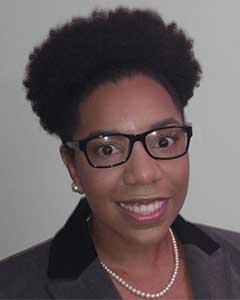
Lakeya McGill, Ph.D. - T32 Research Fellow
Graduate Program: University of Maryland Baltimore County (UMBC), Human Services Psychology
Internship Program: University of Washington Medical Center
Undergraduate Program: Rhodes College
Professional Interests: health equity, neurorehabilitation, chronic pain, sickle cell disease
Fun fact/hobby: "I am from Lexington, a small town in West Tennessee, located about 2 hours from both Memphis and Nashville."
Why I chose Johns Hopkins: "In addition to excellent training, the Johns Hopkins Division of Rehabilitation Psychology and Neuropsychology provides a warm, supportive, and collaborative environment, which is essential for my next career stage." -

Nwakaego “Ada” Nmezi, Ph.D. – Rehabilitation Psychology Fellow, Chief Fellow 2021 - 2022
Graduate Program: University of Florida, Counseling Psychology
Internship Program: Rush University Medical Center
Undergraduate Program: SUNY Oneonta, Psychology & Sociology
Professional Interests: racial and ethnic health disparities in cardiovascular and cerebrovascular health
Fun fact/hobby: "Prior to starting my doctoral degree, I would design my own clothes. Unfortunately, I couldn’t sew so I would have my friend sew the clothes after designing and sourcing my materials. I am the oldest of 4 siblings and the shortest."
Why I chose Johns Hopkins: "I chose Johns Hopkins because of the strong emphasis on cross-cultural considerations in patient care along with a willing desire to engage in patient advocacy and promote health equity among underserved populations."
After Fellowship: Dr. Nmezi has accepted a staff rehabilitation psychologist position at MedStar Good Samaritan Hospital.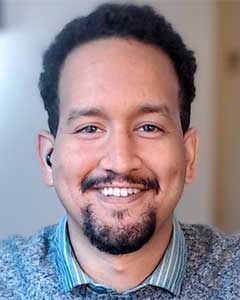
Fenan Rassu, Ph.D. – Pain Psychology Fellow
Graduate Program: Texas A&M University, Clinical Psychology
Internship Program: Baylor College of Medicine
Undergraduate Program: Texas A&M University, Psychology
Professional Interests: pain management, behavioral medicine
Fun fact/hobby: "I enjoy exploring new cities, discovering coffee shops, physical exercise, and creating media designed to educate through entertainment."
Why I chose Johns Hopkins: "The Division of Rehabilitation Psychology and Neuropsychology has a strong focus on providing effective, patient-centered care. Members of the division and their collaborators also conduct innovative and clinically relevant research that benefits patients living with chronic pain."
After Fellowship: Dr. Rassu has accepted a faculty position in the Johns Hopkins PM&R Division of Rehabilitation Psychology and Neuropsychology.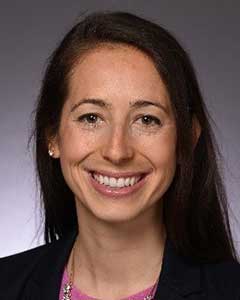
Emily Smith, Ph.D. – Neuropsychology Fellow, Chief Fellow 2021 - 2022
Graduate Program: University of Texas Southwestern Medical Center, Clinical Psychology
Internship Program: University of Texas Southwestern Medical Center
Undergraduate Program: Rhodes College, Neuroscience
Professional Interests: neuropsychological assessment and intervention, neurorehabilitation, brain health, lifestyle factors
Fun fact/hobby: "I enjoy cooking new dishes with novel ingredients and different flavor profiles. I recently learned how to make mussels in honor of the Maryland seafood scene."
Why I chose Johns Hopkins: "I chose Johns Hopkins because of the comprehensive experiences the fellowship program offers. There are endless opportunities for assessment, intervention, as well as consultation with rehab team members. The training environment is extremely supportive and flexible to prioritize my areas of interest. Additionally, training in neurorehabilitation nicely complements my prior experiences in neurodegenerative diseases."
After Fellowship: Dr. Smith has accepted a staff neuropsychologist position at LifeBridge Sinai Hospital.
Contact Us
Please let us know if you have questions about postdoctoral fellowships in the Division of Rehabilitation Psychology and Neuropsychology.
For general inquiries, email [email protected]. For program-specific questions, contact the relevant program directors listed on each program page.
